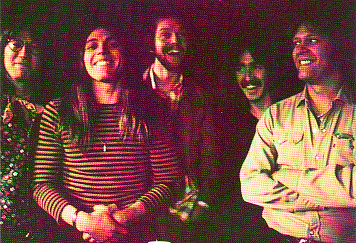

The next album was "Crazy Eyes", released in September1973. Timothy wrote one song on this album, "Here We Go Again". Richie Furay left the band after this album to join the Souther, Hillman, Furay Band with J.D. Souther and Chris Hillman. The album made it to #38 and stayed on the charts for 23 weeks. Following is a review of the album by Andy McKaie:
"After the much overpraised and overrated album and title song single, "A Good Feelin' to Know" failed to set Poco into superstar orbit, it was almost predictable that the group would be torn apart at the seams. That Richie Furay would leave to cavort with John David Souther and Chris Hillman could not be totally expected, but you knew some of the steam would be taken out of their energized happyrock. I mean, how can anybody still be that bubbly after it's fifth determined reach for the sky falls decidedly short. A case of the blues would be more appropriate.
Poco, though, appears to have never heard of the blues and has come up with another enjoyable package of Poco-fried rockers and light, lyrical balladry. The failure of the big push, however, did make the boys a trifle more somber, and the resulting album reflects this precisely.
Turning a highly critical eye towards the platter, there are a couple of weak spots. Furay's beautiful title song, which is nearly arranged to classic proportions by Bob Ezrin and Alan MacMillan, is eventually dragged out to it's melodic breaking point about two-thirds through it's 9 1/2 minutes. The brashly rocking "A Right Along" starts off killer-like, with jet bomber Paul Cotton lead guitar riffs, accompanied by tight rhythmic poundings and hard charging vocals: but, sorry to say, the song closes the first side with a predominance of complacency and a general lack of lustre.

Apart from the eventual downfalls suffered by these two songs, "Crazy Eyes" is chock full of superfine Poco music, albeit on a generally lower key than usual. Three of the most maginficent tunes here are , in fact, plaintive ballads. First we have Tim Schmit's easy rolling, intermittently crescendoing "Here We Go Again" with Gram Parson's "Brass Buttons" and J.J. Cale's "Magnolia" both lilting, melodic, countrified vehicles, given lovingly tender renditions by Furay and crew.
Along with the gargantuan length of "Crazy Eyes," those three ballads tend to give the album a low-keyed, mellow feel. Poco, however, still moves out when it has to. The record's opening cut, Paul Cotton's "Blue Water," is a rollicking country number that gradually garners momentum from Schmit's playful bass, after a patented Rusty Young sweet-as-country-wine pedal steel break. The band bops into a rousing bluegrass ditty, "Fools Gold," complete with flying fiddle, compliments of session man Bill Graham, but the energy level slackens on the following two cuts--both ballads--only to return bigger than ever on the incomplete "A Right Along." Flip the record over and the music doesn't get to Poco's usual upbeat level until the album's closer, and by far the best rocker, "Let's Dance Tonight" --a request you've got to comply with.
The Richie Furay-led Poco goes out with a last restrained by pretty high note. It was a fun band whose eye for success was always bigger than it's talents. It was led to believe the group should've been bigger by deaf'n'blind critics and fans who failed to note Poco's innate limits. Consistency, not excitement, was their trademark and we'll be lucky if the new Poco is nearly as good."

This is what Rusty Young had to say about Richie leaving the band (From Goldmine Magazine, Aug 20,1993): "After Richie left the band, there were a lot of people that said that that was the end of the band. I remember feeling like we really had something to prove when Richie left the band because there were people in the business end, and I'm not going to name names, who wanted the band to end because it would look better for the guys who had left. You know what I mean? The entire Poco audience would go with someone who had left and joined another situation if there was no more Poco, and [they] even went so far as to threaten our booking agency that if they booked us that they'd never get the big clients that these people handled. There were some ugly moments that went down after Richie left. So, it was a real challenge, and it really separated the people who were our friends and believed in us from the people who were just there for the ride.
That was a real challenging time and a really great time because a lot of people really rallied around Tim and Paul and George and me, and it was a time when everyone got to take on more responsibility for the music than they had. We all leaned on Richie pretty heavily in the early days for the music and the vocal direction. I mean, he was the guy. But we never thought that should slight the other guys who were really talented. I don't think any one of us was Poco; Poco was always a combination of talented people."
And this is what Timothy had to say in an interview for LA Free Press when asked if they had considered quitting after Richie left: "No. We, in fact, welcomed the change to a foursome. There's more of an opportunity now for everyone to share in the writing of songs. About quitting, we never even thought about it - we have too much fun playing together."
Poco page 5